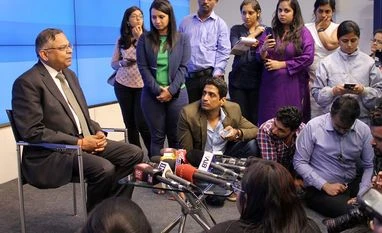A three-decade veteran of the Tata conglomerate and front-runner for the top job since the day his predecessor was ousted, Natarajan Chandrasekaran is one of the group's most highly regarded executives and the man behind its best-performing unit.
A former Tata intern, Chandrasekaran, known as "Chandra", is cited by employees and rivals both for the focus that got him through several marathons and for a prodigious memory.
But a selection panel's unanimous choice on Thursday of the self-effacing Tata lifer to take the reins at holding company Tata Sons is also about a strong desire for loyalty and continuity - even if he is unrelated to the Tata family and will be the first non-Parsi to hold the role.
India's largest conglomerate has been badly shaken by a bruising months-long fight between former Chairman Cyrus Mistry, ousted in October, and patriarch Ratan Tata.
Like the Tatas, the Mistrys are part of Mumbai's tight-knit Parsi religious minority, and Cyrus Mistry's sister is married to Ratan Tata's half-brother. Chandrasekaran, by contrast, was born into a south Indian agricultural family, joining Tata in 1987.
To pick Mistry, who succeeded Tata in December 2012, a five-man selection team spent 15 months searching. Chandrasekaran, who also sits on the board of India's central bank, was chosen in less than three months.
More From This Section
"Chandrasekaran's foremost challenge will be to regain the trust and loss of reputation of the Tata group and addressing investor concerns," said Shriram Subramanian, founder of Ingovern, a proxy advisory firm.
"One has to see what his relationship will be with the Tata trust and Mistry's holding companies, and whether he will be a yes-man to Ratan Tata. But from the competency perspective he is fully capable."
BACKROOM OPERATOR
An avid photographer turned marathon runner later in life, Chandrasekaran has run Tata Consultancy Services - India's most valuable company, accounting for the single largest share of Tata Sons profit - since 2009.
Before taking on TCS from his leaf-fringed, colonial office in south Mumbai, Chandra, now 53, was seen by rivals and insiders as a backroom operator. He was strong on technology, they said, but low on charisma compared with industry peers such as Infosys Ltd founders N R Narayana Murthy and Nandan Nilekani.
Then 46, he was one of the youngest CEOs of the Tata group.
Critics forecast his quiet presence would struggle to engage the top bosses of overseas clients to win deals and retain existing clients in the cutthroat Indian outsourcing industry.
Chandrasekaran surprised: a cautious and meticulous manager, he embraced the sales role. TCS's shares and revenue have risen almost fourfold since he took over, while headcount almost tripled.
"Chandrasekaran instilled aggression into TCS," said Vibhor Singhal, vice president at Mumbai-based broker PhillipCapital. "It was under him that TCS forayed into newer geographies like Japan, and took to new automation platforms, like Ignio."
But his new role will test more than his sales skills - it will also call for diplomacy as he rebuilds ties and relationships.
"He is a professional, and not related to the Tatas which makes him unbiased, and that will help him in gaining confidence of small and large shareholders," said Deven Choksey, managing director at K R Choksey Shares and Securities.
"I expect the market to take this news positively and Tata company shares to gain."
Married, Chandrasekaran lives in central Mumbai with his wife and teenaged son.
)